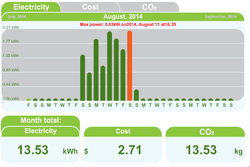My utility has an FAQ dedicated to similar questions and they state that the funds come from grants and the state at no extra cost to the customer. The funds are also limited and the program ceases once it runs dry.Your delivery bill is also likely paying for the big rebate you got on that water heater.
Additionally these rebates wouldn't exist if the utility itself also did not benefit. Each utility has a finite capacity and at times of extreme conditions this capacity may be stressed due to inefficient appliances, by moving consumers and businesses to energy efficient appliances the utility preserves it's capacity. For example, the company I work for has it in the contract that should the utility not be able to provide enough power due to the utilities capacity, they must pay us to run our generators. I doubt my business is the only one.
Last edited:


 ! It runs for 20 mins on electric element at 4,500 watts. oops.
! It runs for 20 mins on electric element at 4,500 watts. oops.
